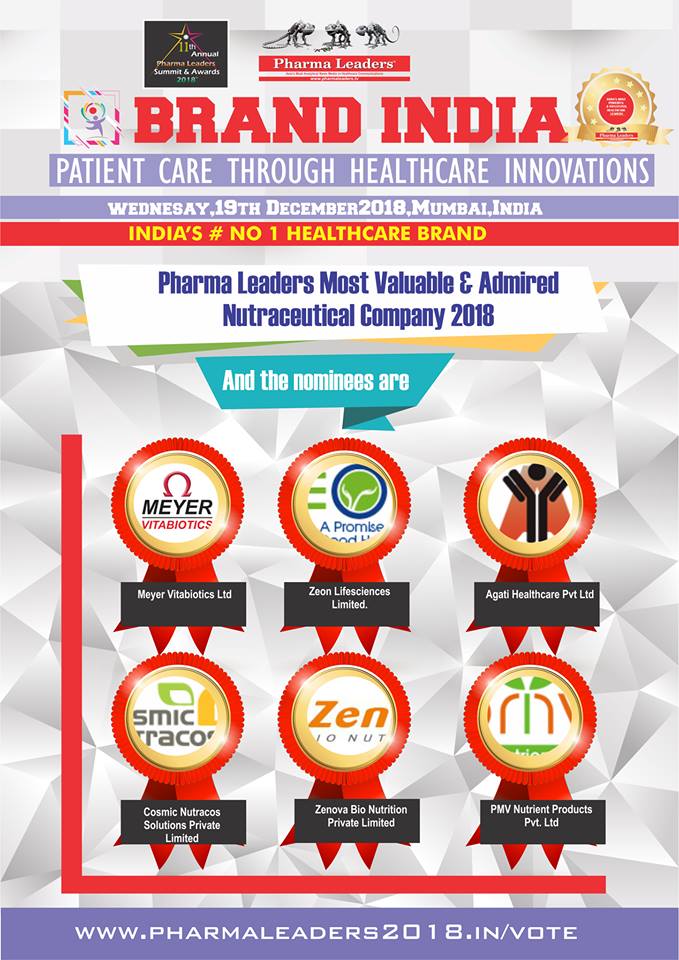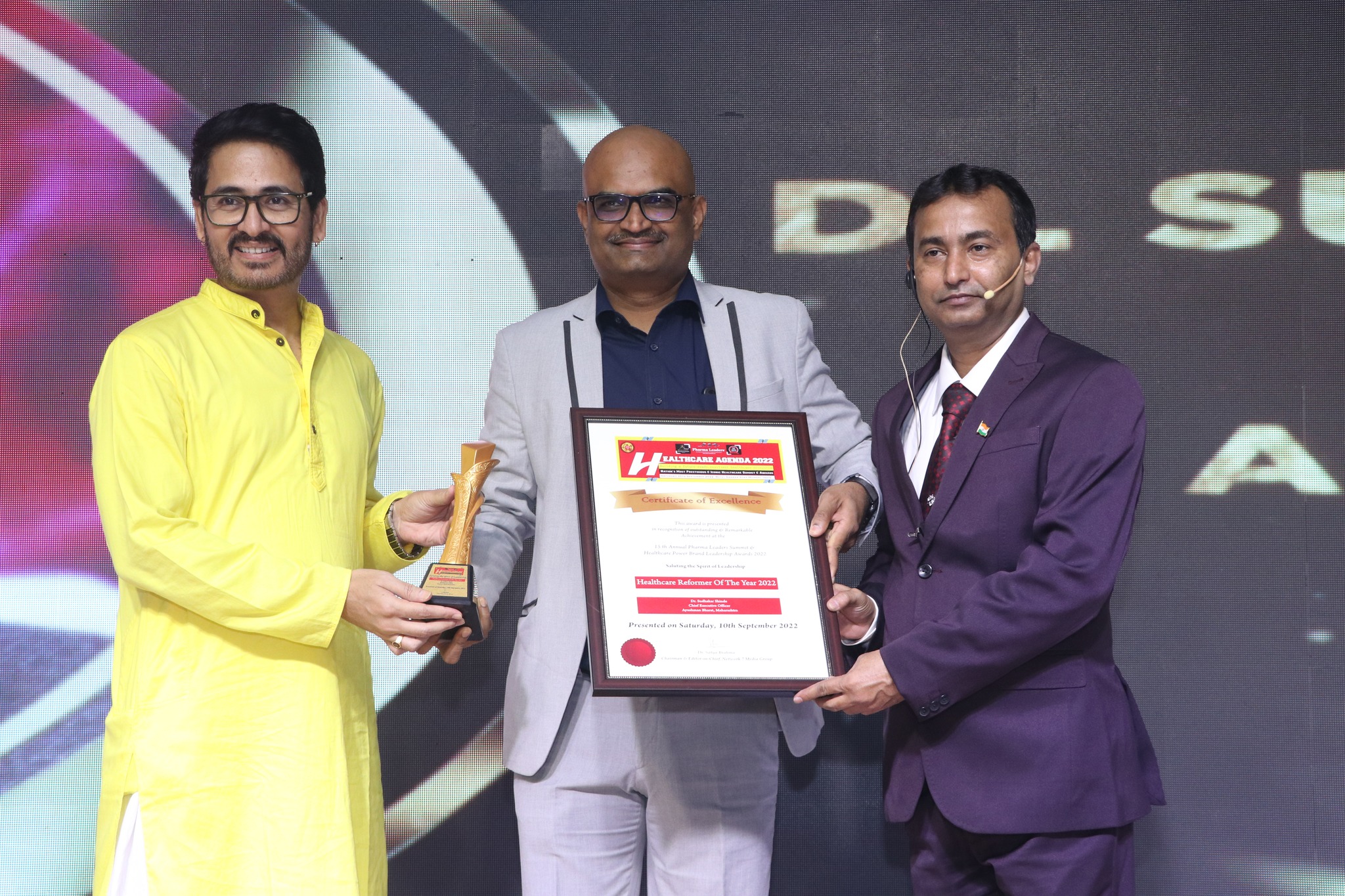Meyer Vitabiotics, Zeon Lifesciences, Agati Healthcare, Cosmic Nutracos Solutions, Zenova Bio Nutrition, PMV Nutrient Products are the final six nominees at the 11th Annual Pharma Leaders Power Brand Awards in the category of Pharma Leaders Most Valuable & Admired Nutraceutical Company 2018
Pharma Leaders Most Valuable & Admired Nutraceutical Company 2018 Nominees
- Meyer Vitabiotics Ltd
2. Zeon Lifesciences Limited.
3. Agati Healthcare Pvt Ltd
4. Cosmic Nutracos Solutions Pvt. Ltd
5. Zenova Bio Nutrition Private Limited
6. PMV Nutrient Products Pvt. Ltd
India’s Nutraceuticals Makret is expected to grow at a compounded annual growth rate of 21% to reach US $ 18 bn by 2025 from the current $4bn, according to ASSOCHAM-MRSS joint report.The increased emphasis on health and wellness and more disposable incomes have turned favourable for nutraceuticals market. Indian market has key players which consists both Indian as well as multi-national companies. Nutraceuticals industry is showing great signs for near as well as long-term future and players definitely need to look at various options at their disposals in order to make out the most of it.
Globally, the nutraceuticals market is expected to reach $ 578.23 billion by 2025 from $ 294.49 billion in 2017. Demand for products in Brazil, China, India, South Korea, Poland and Mexico is increasing, and the compound annual growth rate of the dietary supplement sector is expected to exceed 9.7% from 2017 to 2025, adds the paper. The Indian nutraceutical market was estimated to be worth about $4 billion in 2017 and is expected to grow at a significant compound annual growth rate (CAGR) of 21 per cent to $10 billion in 2022.
This is likely be fuelled by a significant growth of 25 per cent per annum in the functional beverage market accompanied by similar potential growth from the other segments. Dietary supplements account for over 60 per cent of this market. A few industries in India today offer such spectacular growth potential. The dietary supplement market is classified on the basis of product type – vitamins and minerals, herbal supplements, protein supplements and Chavanprash. The market for dietary supplements is expected to touch the $5.90-billion by 2022 at a CAGR of 19 per cent. Vitamins and minerals (which account for approximately 40 per cent) are the major contributors, followed by herbal supplements and proteins. The nutraceutical market in India is becoming increasingly competitive with the entry of major ingredient manufacturers and suppliers, food fortification companies, Ayurvedic and herbal extract manufacturers and distributors, apart from the leading fast-moving consumer goods (FMCG), food and beverage and pharmaceutical companies.
The penetration of the nutraceutical market in India is just above 10 per cent at the all-India level. While it is high (22.51 per cent) in urban India, it is merely 6.32 per cent in rural India. India represents just two per cent of the global nutraceutical market and is way behind in terms of per capita expenditure on nutraceuticals (just $2.5 compared to the global average of $21).
Though traditionally pharmaceuticals dominated, dietary supplements had the major weightage in market. The recent shift in consumerism has resulted in the functional food and functional beverages together occuping 67 per cent of the market. The Indian nutraceutical market is highly concentrated in South India, followed by East India. The top three states are Andhra Pradesh, Tamil Nadu and West Bengal.
The urban-centric Indian nutraceutical market is gradually gaining ground in rural India, with the recent penetration of lifestyle diseases in those parts. Rural India occupies nearly a third of the market.
With India’s strong tradition of consuming natural healthy foods, the market of functional foods is likely to boom in the next five years. The highest growth is likely to be in such sub-categories as energy drinks, enhanced shelf-stable juices, probiotics and omega-fortified foods and beverages. These foods and beverages, personalised to manage certain health conditions, are the future of the functional health food market.
Dietary supplements targeted at women and children have a bright future. Preventive dietary supplements for diseases, such as cancer, diabetes, obesity and arthritis, are also much sought after.
The Indian dietary supplement market is composed of over 500 participants. The vitamin and mineral supplement market is the most competitive with over 100 participants.
Further, India is opening up its market to foreign players. This could lead to healthy competition in this sector.
In the recent past, there have been many changes in the spending habits of the urban population of the country, they have become more health-conscious.
Gymnasiums, health clubs and yoga centres have been contributing to the growing demand for vitamins and dietary supplements. For a new and emergent category like nutraceuticals, distribution chain is a critical driver of success.
The distribution channel also has a major role to play in building and sustaining consumers’ and stakeholders’ confidence, brand building and accelerating the reach of such products in Tier-III cities.
Several types of channel options are emerging. Some of the established modern trade channels are merchandising nutraceuticals, thereby enhancing its visibility and availability.
Sometimes it is sold over-the-counter (OTC), so chemists’ shops would be a familiar channel for purchase. We also observe exclusive outlets for functional foods, beverages, vitamins and nutrients.
Chains like Neulife and GNC are inspiring, perhaps setting benchmarks for other entrepreneurs to venture into such distribution initiatives.
Exclusive outlets provide more credibility to consumers, as they also builds relationships with the buyers.
Gymnasiums themselves also stock and promote functional foods, beverages, vitamin and mineral supplements. Several nutritionists also act as distribution points for such products. The market for dietary supplements is roughly $2.5 billion, and it is expected to touch $5.90 billion by 2022 at a CAGR of 19 per cent. It is very difficult to have an actual picture of the current trends at this point. But the market for dietary supplements is expected to touch $5.90 billion by 2022 at a CAGR of 19 per cent.
Out of this, the share of the protein supplement market is about 25 per cent. Presently, vitamin supplements are the need of the hour. They have a strong brand proposition, followed by protein and iron. The growth in this category will likely be driven by dietetic supplements consumption by an urban, fitness-conscious young population.
Elaborate on the current import and export scenario of nutritional and dietary supplements in India.
FSSAI released a draft on amendment to import regulations, which was earlier released as a notice for comments in June 2017. It contained three major points, which were as follows:
Custom authorities shall not clear any article of food unless it has a valid shelf life of not less than 60 per cent, or three months before expiry, whichever is less, at the time of import
The importer shall submit a certificate of sanitary export from an authorised agency in the exporting country for the categories of food as may be specified by the food authority from time to time
Risk-based clearance (based on track record, product compliance, country of origin, etc.)



